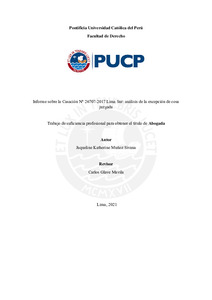Informe sobre la Casación N° 26707-2017 Lima Sur: análisis de la excepción de cosa juzgada
Abstract
El presente informe analiza la Sentencia N° 26707-2017 Lima Sur emitida por la Sala de
Derecho Constitucional y Social Permanente de la Corte Suprema dentro de un proceso
de prescripción adquisitiva de dominio. La elección de esta resolución judicial se justifica
en que realiza un análisis particular y deficiente de la institución procesal de la excepción
de cosa juzgada y con ello de la triple identidad. El objetivo fundamental propuesto es
determinar si, independientemente del resultado, el análisis de la infracción normativa
por interpretación errónea del artículo 452 del Código Procesal Civil fue el correcto a la
luz del ordenamiento jurídico y de los antecedentes del caso. Asimismo, la hipótesis que
se formula consiste en que, si bien debió declararse infundada la excepción, el análisis
requirió de mayor profundidad. Esto porque sí existe una identidad jurídica en las partes,
mas no en el pedido ni en interés para obrar. En ese sentido, se realiza un análisis
doctrinario y jurisprudencial de la cosa juzgada y de los elementos de la triple identidad.
Luego de la investigación -a partir de tres métodos jurídicos de investigación: dogmático,
exegético y funcional- se concluye que la Sentencia examinada realiza un análisis
deficiente de todos los elementos de la triple identidad al (i) no considerar la institución
de la acumulación subjetiva de pretensiones, (ii) no precisar el pedido de ambos procesos
y (iii) al realizar una evaluación deficiente del interés para obrar. This report analyzes the Court Verdict No. 26707-2017-Lima Sur, issued by the Sala de
Derecho Constitucional y Social Permanente of the Supreme Court within an adverse
possession process. The choice of this judicial resolution is justified because it carries out
a deficient and particular analysis of the procedural institution of the exception of res
judicata and, thus, the triple identity. The fundamental objective is to determine whether,
regardless of the outcome, the analysis of the normative infringement by misinterpretation
of article 452 of the Civil Procedure Code was correct in the light of the legal system and
the background of the case. Furthermore, the hypothesis put into question is that, although
the exception should have been declared unfounded, it is required a more depth analysis.
This is because there is a legal identity of the parties, but not in the request or in the
interest to act. In that sense, a doctrinal and jurisprudential analysis of res judicata and
the elements of triple identity is carried out. Following the research, based on three legal
methods of research: dogmatic, exegetical and functional, it is concluded that the
examined court decision performs a deficient analysis of all the elements of the triple
identity due to (i) not considering the institution of the subjective accumulation of claims;
(ii) not specifying the request for both processes; and (iii) making a poor assessment of
the interest in acting.
Temas
Perú--Legislación
Cosa juzgada--Legislación--Perú
Recurso de casación--Legislación--Perú
Cosa juzgada--Legislación--Perú
Recurso de casación--Legislación--Perú
Para optar el título de
Abogado





